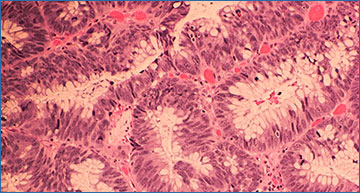
From The Scientist by Jef Akst
Most models of how tumors evolve have assumed that the process is based predominately on cancer cells’ genetics, and many cancer treatments are specifically targeted to mutations associated with disease. But comparing whole genome sequence data with RNA-seq data from samples of colorectal tumors revealed that the vast majority of gene expression differences among cancer cells cannot be explained by genetics, researchers report in Nature today (October 26).
“So far, a lot of the work that’s been done exploring cancer evolution in cancer development has focused very much on just the genetics,” says Nicholas McGranahan, a computational cancer researcher at the University College London Cancer Institute’s CRUK UCL Centre who was not involved in the research. But according to the new study, “there’s lots of these alterations that they can’t identify a clear [genetic]underpinning for. . . . It’s a nice study because it highlights some of the limitations of what we’ve been doing before.”
To gain a better understanding of how cancer cells vary at the gene expression level, the team carried out whole-transcript RNA-seq as well as whole genome sequencing on samples from 27 surgically removed human colorectal tumors, eight of which yielded sufficient data for comparisons between the two types of sequencing. In those eight tumors, out of 8,368 differentially expressed genes included in the analysis, the differences in transcript levels could be traced to underlying genetics in only a median of 166.
“A large proportion of the [cancer research]community always believed that everything was genetically controlled,” Sottoriva says, but these results suggest that “the answer is not strictly genetics.”
Househam J, Heide T, Cresswell GD, Spiteri I, Kimberley C, Zapata L, Lynn C, James C, Mossner M, Fernandez-Mateos J, Vinceti A, Baker AM, Gabbutt C, Berner A, Schmidt M, Chen B, Lakatos E, Gunasri V, Nichol D, Costa H, Mitchinson M, Ramazzotti D, Werner B, Iorio F, Jansen M, Caravagna G, Barnes CP, Shibata D, Bridgewater J, Rodriguez-Justo M, Magnani L, Sottoriva A, Graham TA. (2022) Phenotypic plasticity and genetic control in colorectal cancer evolution. Nature [Epub ahead of print]. [article]
Heide T, Househam J, Cresswell GD, Spiteri I, Lynn C, Mossner M, Kimberley C, Fernandez-Mateos J, Chen B, Zapata L, James C, Barozzi I, Chkhaidze K, Nichol D, Gunasri V, Berner A, Schmidt M, Lakatos E, Baker AM, Costa H, Mitchinson M, Piazza R, Jansen M, Caravagna G, Ramazzotti D, Shibata D, Bridgewater J, Rodriguez-Justo M, Magnani L, Graham TA, Sottoriva A. (2022) The co-evolution of the genome and epigenome in colorectal cancer. Nature [Epub ahead of print]. [article]




